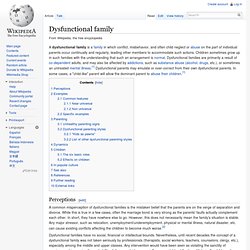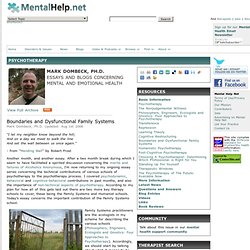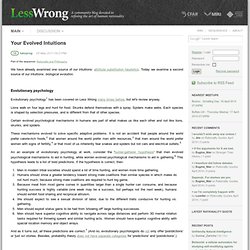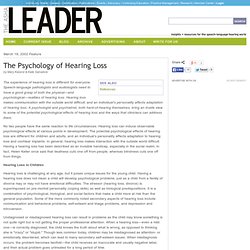

155.3- Sex Psychology. Dysfunctional family. Perceptions[edit] A common misperception of dysfunctional families is the mistaken belief that the parents are on the verge of separation and divorce.

While this is true in a few cases, often the marriage bond is very strong as the parents' faults actually complement each other. In short, they have nowhere else to go. However, this does not necessarily mean the family's situation is stable. Any major stressor, such as relocation, unemployment/underemployment, physical or mental illness, natural disaster, etc. can cause existing conflicts affecting the children to become much worse.[2] Dysfunctional families have no social, financial or intellectual bounds.
Examples[edit] Dysfunctional family members have common features and behavior patterns as a result of their experiences within the family structure. Common features[edit] Near universal[edit] Some features are common to most dysfunctional families: Non universal[edit] Specific examples[edit] Boundaries and Dysfunctional Family Systems - Psychotherapy Treatment And Psychotherapist Information. Mark Dombeck, Ph.D.

Updated: Aug 1st 2006 "I let my neighbor know beyond the hill; And on a day we meet to walk the line And set the wall between us once again. " - from "Mending Wall" by Robert Frost Another month, and another essay. After a two month break during which I seem to have facilitated a spirited discussion concerning the merits and failures of Alcoholics Anonymous, I'm now returning to my ongoing essay series concerning the technical contributions of various schools of psychotherapy to the psychotherapy process. Family Systems practitioners are the ecologists in my scheme for describing the various schools (Philosophers, Engineers, Ecologists and Gnostics: Four Approaches to Psychotherapy). Numerous authors contributed to the development of the Family Systems perspective, including influential clinicians such as Virginia Satir, Murray Bowen, Jay Haley and Salvador Minuchin.
A boundary is a barrier; something that separates two things. Enmeshment and Detachment Hi, Your Evolved Intuitions. Part of the sequence: Rationality and Philosophy We have already examined one source of our intuitions: attribute substitution heuristics.

Today we examine a second source of our intuitions: biological evolution. Evolutionary psychology Evolutionary psychology1 has been covered on Less Wrong many times before, but let's review anyway. Lions walk on four legs and hunt for food. Certain evolved psychological mechanisms in humans are part of what makes us like each other and not like lions, skunks, and spiders. These mechanisms evolved to solve specific adaptive problems. An an example of evolutionary psychology at work, consider the 'hunter-gatherer hypothesis' that men evolved psychological mechanisms to aid in hunting, while women evolved psychological mechanisms to aid in gathering.6 This hypothesis leads to a list of bold predictions.
And as it turns out, all these predictions are correct.7 (And no, evolutionary psychologists do not only offer 'postdictions' or 'just so' stories. Notes. Teaching a Deaf Child Her Mother's Tongue. Happy Mother’s Day A series of posts honoring wilted flowers, handmade cards and breakfast in bed.

Most babies are born into the culture and community of their families. If the family is Latino or Tatar or Han Chinese, so is the baby. The baby learns the family’s language — “the mother tongue.” Culture and language are passed down from parents to child. Except when the child is born deaf. Most parents simply whisper and coo to their children in their native tongues. We chose spoken language, primarily. Hearing technologies — in the form of digital hearing aids and cochlear implants — have come so far as to make this a viable option even for our younger daughter, who was born profoundly deaf. More than 90 percent of deaf children are born to hearing parents. But this technological opportunity is relatively new, and a long and troubled history of deafness still reverberates with pain and anger.
Jennifer Rosner is author of “If A Tree Falls: A Family’s Quest to Hear and Be Heard.” The Psychology of Hearing Loss. The experience of hearing loss is different for everyone.

Speech-language pathologists and audiologists need to have a good grasp of both the physical—and psychological—realities of hearing loss. Hearing loss makes communication with the outside world difficult, and an individual’s personality affects adaptation of hearing loss. A psychologist and psychiatrist, both hard-of-hearing themselves, bring an inside view to some of the potential psychological effects of hearing loss and the ways that clinicians can address them. No two people have the same reaction to life circumstances. Hearing loss can induce observable psychological effects at various points in development.